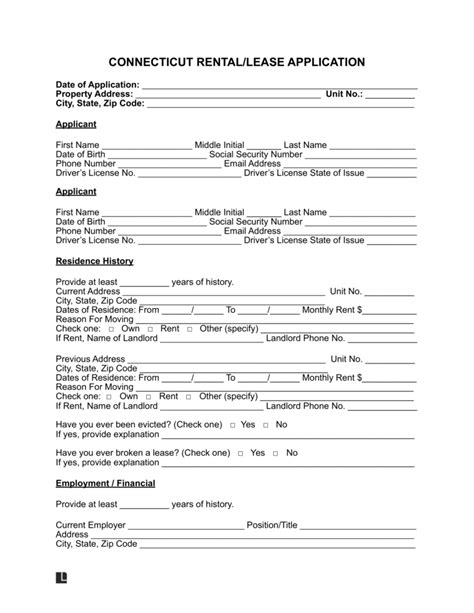As a landlord in Connecticut, having a comprehensive rental application form is crucial to finding the right tenant for your property. A well-structured application form helps you to gather essential information about potential tenants, assess their creditworthiness, and make informed decisions about who to rent to. In this article, we will provide you with a detailed guide on creating a CT rental application form that meets your needs and complies with state laws.
Importance of a Rental Application Form

A rental application form is a vital tool for landlords, as it helps to:
- Verify the identity and employment status of potential tenants
- Assess their credit history and financial stability
- Evaluate their rental history and any past evictions
- Determine their eligibility for the rental property
Required Information for a CT Rental Application Form
When creating a rental application form for your CT property, you should include the following essential information:
- Applicant's personal details: name, date of birth, Social Security number, and driver's license number
- Employment information: current employer, job title, income, and length of employment
- Rental history: previous landlords, rental dates, and reason for leaving
- Credit information: permission to run a credit check and a statement explaining how the credit score will be used
- Income verification: proof of income, such as pay stubs or tax returns
- Emergency contact information: name, phone number, and address of an emergency contact
CT Rental Application Form Templates

There are many CT rental application form templates available online, which can save you time and effort. However, it's essential to customize the template to fit your specific needs and comply with state laws. Some popular websites offering free CT rental application form templates include:
- Rocket Lawyer
- Nolo
- LawDepot
- Zillow
CT Rental Application Form Laws and Regulations
As a landlord in CT, you must comply with state laws and regulations when creating and using a rental application form. Some key laws to consider include:
- The Fair Housing Act (FHA): prohibits discrimination based on race, color, national origin, sex, familial status, or disability
- The Connecticut Fair Housing Law: prohibits discrimination based on marital status, age, or sexual orientation
- The Connecticut Credit Reporting Act: regulates the use of credit reports in rental applications
Best Practices for Using a CT Rental Application Form

To get the most out of your CT rental application form, follow these best practices:
- Clearly explain the application process and requirements to potential tenants
- Use a secure online application system to protect sensitive information
- Verify the identity of applicants through government-issued ID
- Conduct thorough background checks and credit checks
- Keep accurate records of all applications and communications
Conclusion
A well-crafted CT rental application form is essential for finding the right tenant for your property. By including the required information, complying with state laws and regulations, and following best practices, you can streamline the application process and make informed decisions about who to rent to.
Gallery of CT Rental Application Form Templates






FAQ Section
What information should I include in a CT rental application form?
+A CT rental application form should include personal details, employment information, rental history, credit information, income verification, and emergency contact information.
Can I use a template for my CT rental application form?
+Yes, you can use a template for your CT rental application form. However, make sure to customize it to fit your specific needs and comply with state laws.
How do I verify the identity of applicants?
+You can verify the identity of applicants by requiring government-issued ID and conducting thorough background checks.
